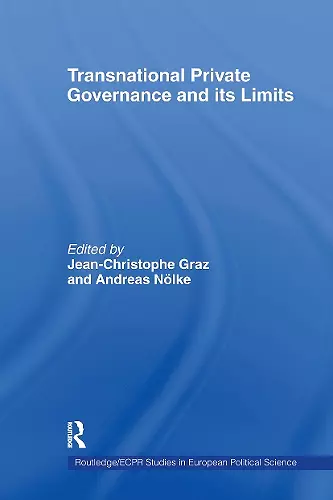Transnational Private Governance and its Limits
Jean-Christophe Graz editor Andreas Nölke editor
Format:Paperback
Publisher:Taylor & Francis Ltd
Published:20th Jan '12
Currently unavailable, and unfortunately no date known when it will be back
This paperback is available in another edition too:
- Hardback£150.00(9780415414357)

This volume explores a variety of forms of transnational private governance where non-state actors cooperate across borders to establish rules and standards accepted as legitimate by other agents.
Transnational private governance is a core feature of the devolution of power that we observe in the global realm and that is bringing about new forms of authority. Transnational Private Governance provides theoretically and empirically informed insights into the interactions between states and non-state actors including domains beyond intergovernmental organizations, conventional non-governmental organizations, and multinational enterprises, covering a wide range of arrangements, from highly formal devolutions of power to lax and informal platforms of interaction between private actors. Contributing to the latest generation of globalization studies, the authors consider the relationship between states and markets as closely integrated and seek to broaden the scope of enquiry by including new patterns and agents of change on a transnational basis.
This book will be of great interest to researchers and students of political science, international political economy, economics, business studies, globalisation and law.
'Graz and Nölke have brought together a variety of perspectives on a whole sector of transnational arrangements that do not directly involve states and which are designed to regulate activities or to negotiate consensus on practices across national borders at both regional and international levels. They have derived from these different perspectives on particular cases some general propositions about the broader significance of these arrangements for world order. Their book raises important questions concerning the power relations that these arrangements reinforce. Do they bias outcomes in favour of the more powerful corporate entities? Do they privilege technocratic professionalism? Do they escape democratic accountability? Graz and Nölke are to be congratulated for bringing this complex phenomenon, which has sometimes been seen as a benign adjunct to globalizing neoliberalism, into a focus for critical evaluation.' - Robert W. Cox, York University, Canada
'This is an important contribution to an expanding literature. The book makes an especially clear argument about the severe limits to the democratic accountability of private governance despite the frequent protestations about the openness of many stakeholder processes.' - Craig N. Murphy, Wellesley College, USA
'As the level and scope of cross-border integration increase, awkward questions arise concerning the appropriate nature and form of governance for this changing world of ours. Private actors have often filled the breach opened by the simultaneous erosion of state capacity to govern and a failure of public authorities to achieve adequate cross-border pooling of their 'sovereignty' to keep pace with cross-border activity of increasing complexity. Building on an already prodigious literature dating from the early 1990s on private actors in global governance, this fine study takes a fresh, insightful and, above all, critical look (in the best sense of the term) at the dilemmas which democratic policy-making processes face in such a context. Questions once raised by Susan Strange or Benjamin J. Cohen, such as "who governs?" and "in whose interest?" receive fresh and innovative analysis from Graz and Noelke and their contributors. Broadening the coverage of existing studies and deepening our understanding, this is a serious effort to understand better where and how private power and authority can and should fit in the governance of a transnational world which nonetheless aspires to a strong public domain under a democratic order. This study should inspire scholars and policy-makers alike to think more deeply and eschew the path of least resistance when it comes to resolving our problems of governance in a globalising world.' - Geoffrey R.D. Underhill, University of Amsterdam, the Netherlands
ISBN: 9780415664240
Dimensions: unknown
Weight: 560g
304 pages